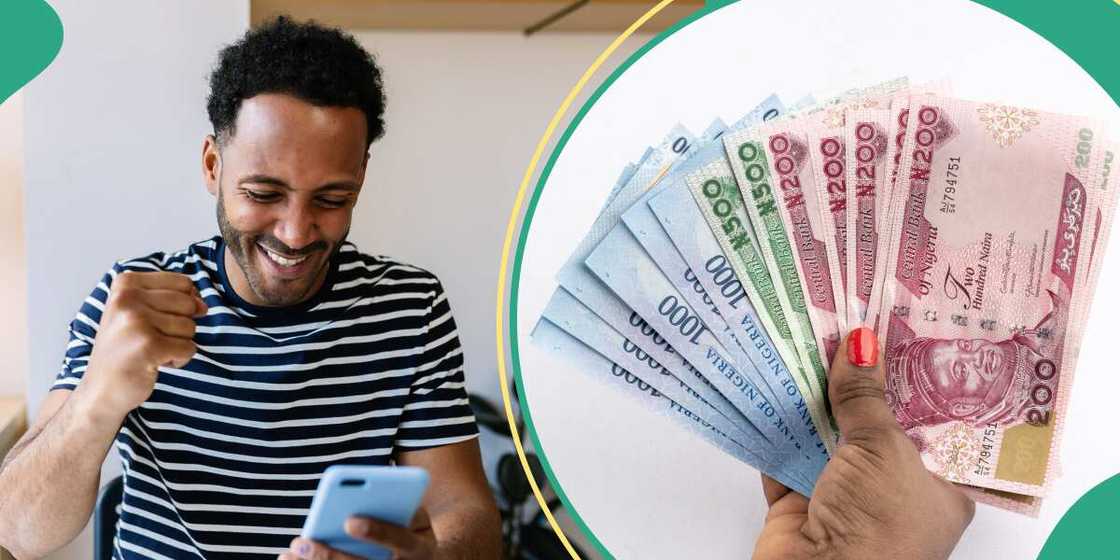FG to Allow Opay, PalmPay, PiggyVest, Other Fintechs Participate in Forex Trading
- The Nigerian government is allegedly considering opening up the Official Forex market to fintech firms
- The development is a move to seek lasting solutions to the freefall of the Naira and also shut out black market dealers
- Taiwo Oyedele, a key member of President Bola Tinubu's tax and fiscal policy reform committee, said this recently
Pascal Oparada has over a decade of experience covering Tech, Energy, Stocks, Investments, and Economy
In a desperate move to stabilize the Naira, the Nigerian government is considering expanding its official Forex market to allow the participation of financial technology companies, also known as fintech.
The fintech firms will be allowed as legitimate participants in a move to shut out currency speculators who are believed to be behind the appalling performance of the Naira against the dollar.

Source: Getty Images
FG to outlaw black operators
According to reports, Taiwo Oyedele, the Chairman of the Presidential Committee on Tax Reforms and Fiscal Policy, disclosed this during the Nigerian Economic Summit Group (NESG) conference.
PAY ATTENTION: Donate to Legit Charity on Patreon. Your support matters!
Oyedele said part of the Committee's recommendation is imposing excise duty on Forex transactions outside the official market.
He said the move would outlaw currency speculators responsible for the Naira's downfall.
The Naira made a remarkable recovery on Wednesday, October 25, 2023, after days of freefall at both the official NAFEM and parallel markets.
Naira regains strength against the dollar after days of freefall
The local currency had tumbled to N1,310 to the dollar in the parallel market, sparking fear among Nigerians that it could hit N2,000 to a dollar before December.
But on Wednesday, October 25, 2023, the fortunes of the Nigerian currency reversed after trading at N1,300 per dollar on the streets from the N1,310 it traded the previous day and gained even more in NAFEM, trading for N801.10 from the N847.77 it sold on Tuesday, October 24, 2023, Legit.ng reported.
The Nigerian currency has been weighed down by a lack of Forex in the system, which has caused high inflation at 26.7% as of September and high living standards.
FG expecting $10 billion Forex inflow into the economy
Analysts believe that Nigeria has about $7 billion FX backlog weighing down on the economy, with the government stating that it expects a $10 billion inflow in the coming weeks.
The Minister of Finance and Coordinating Minister of the Economy, Wale Edun, disclosed in the recent NESG conference that the expected Forex inflow will ease liquidity in the system.
Oyedele's statement is one of the 20 recommendations presented by the Tax Reform Committee to the Federal Government.
The development has led to a wide gap between the official and parallel markets.
FG seeks to digitize the FX market to stabilize the naira
Oyedele said there are plans to digitalize Nigeria's fx regime, discourage speculative demands, and the hoarding of fx in cash.
"Discontinue the fx verification portal and requirement for Certificate of Capital Importation and export proceeds restriction," Oyedele said
This depreciation follows the recent removal of Forex restrictions on 43 items by the Central Bank of Nigeria (CBN) to counter the Naira's depreciation on the parallel market.
Analysts raise eyebrows
Analysts believe the move will come with some challenges as most Nigerians regard the fintech firms as unreliable.
The move will also spark regulatory bottlenecks as only commercial banks and the Bureau de Change (BDC) operators are allowed by the Central Bank of Nigeria (CBN) to trade Forex legitimately.
Emmanuel Ehinola, a financial analyst and currency dealer, said that the fintech firms have a lot of work to do to build their trust portfolio.
"Most of these fintech firms operate mainly online and have limited physical presence. This is a significant hurdle because Nigerians will hardly put their money into something they cannot interact with physically.
"I am sure any regulation or legislation will demand that any fintech firms seeking to trade in Forex must be physically present," Ehinola said.
ABCON asks CBN to allow them to crash the dollar via PoS, online Operations, Others
Earlier, Legit.ng reported that currency dealers under the aegis of the Association of Bureau de Change of Operators of Nigeria (ABCON) have asked the Central Bank of Nigeria (CBN) to let Bureau de Change operators carry out online dollar transactions and Point of Sale (PoS) agency to boost forex liquidity.
The association asked the apex bank to grant them the regulatory approvals to let BDCs access diaspora remittances via International Money Transfer Operators (IMTOs) proceeds.
Aminu Gwadabe, ABCON President, revealed this in a statement where he said that the participation of currency dealers in the retail segment of the Forex market would aid in achieving a stable, solid, and virile exchange rate.
Source: Legit.ng


